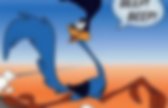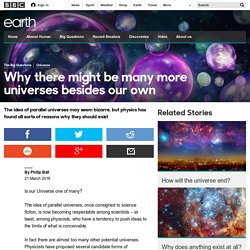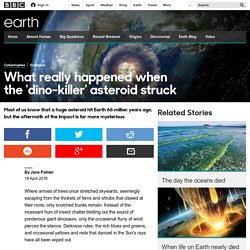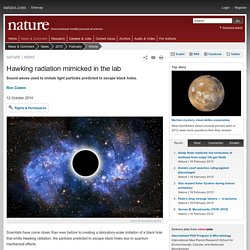

Graham
BBC Radio 4 - Radio 4 in Four - From balti to bhuna: the ultimate guide to curry. How to Argue Better. IoT. Programming. BBC News. Earth - Why there might be many more universes besides our own. Is our Universe one of many?

The idea of parallel universes, once consigned to science fiction, is now becoming respectable among scientists – at least, among physicists, who have a tendency to push ideas to the limits of what is conceivable. In fact there are almost too many other potential universes. Physicists have proposed several candidate forms of "multiverse", each made possible by a different aspect of the laws of physics. The trouble is, virtually by definition we probably cannot ever visit these other universes to confirm that they exist. So the question is, can we devise other ways to test for the existence of entire universes that we cannot see or touch? Worlds within worlds In at least some of these alternative universes, it has been suggested, we have doppelgängers living lives much like – perhaps almost identical to – our own. Giordano Bruno speculated that the Universe might be infinite The patchwork universe There must be worlds identical to Earth somewhere out there.
Earth - What really happened when the 'dino-killer' asteroid struck. Where armies of trees once stretched skywards, seemingly escaping from the thickets of ferns and shrubs that clawed at their roots, only scorched trunks remain.

Instead of the incessant hum of insect chatter blotting out the sound of ponderous giant dinosaurs, only the occasional flurry of wind pierces the silence. Darkness rules: the rich blues and greens, and occasional yellows and reds that danced in the Sun's rays have all been wiped out. This is Earth after a six-mile-wide asteroid smashed into it 66 million years ago. "In the course of minutes to hours it went from this lush, vibrant world to just absolute silence and nothing," says Daniel Durda, a planetary scientist at the Southwest Research Institute in Colorado. "Especially in the thousands of square miles around the impact site, the slate was just wiped clean. " Much like putting in all the edge pieces of a jigsaw, scientists have outlined the lasting impacts of the meteor strike. These studies tell a cataclysmic story. Word Formation, A Pearl of Resources.
Broadcast Yourself.
Whooshcentre.com. Unique learning. Online Video Cutter - Cut Video, Cut MP4, AVI, MPG, 3GP. UK Data sets. Tools. SCIENCE - Physics & Physical Science. How Quantum Physics affects our Ideas of Reality. Physics. Hawking radiation mimicked in the lab. Victor De Schwanberg/SPL Scientists have come closer than ever before to creating a laboratory-scale imitation of a black hole that emits Hawking radiation, the particles predicted to escape black holes due to quantum mechanical effects.

The black hole analogue, reported in Nature Physics1, was created by trapping sound waves using an ultra cold fluid. Such objects could one day help resolve the so-called black hole ‘information paradox’ - the question of whether information that falls into a black hole disappears forever. The physicist Stephen Hawking stunned cosmologists 40 years ago when he announced that black holes are not totally black, calculating that a tiny amount of radiation would be able to escape the pull of a black hole2. This raised the tantalising question of whether information might escape too, encoded within the radiation. Hawking radiation relies on a basic tenet of quantum theory — large fluctuations in energy can occur for brief moments of time.